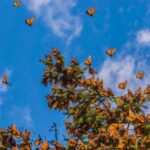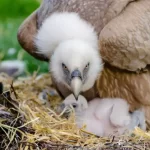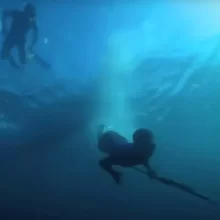Hunter Killed After Shot Elephant Falls Over And Crushes Him
The post Hunter Killed After Shot Elephant Falls Over And Crushes Him appeared first on Healthy Holistic Living.
Our actions frequently affect wildlife in various ways within the natural world’s complex interactions. From the seemingly benign act of feeding animals in their habitats to the more overtly destructive practices like deforestation and pollution, humanity’s footprint on nature is indelible and, more often than not, problematic. Yet, there exists a more direct and confrontational point of contact between man and beast: hunting. Amidst the backdrop of this age-old practice, some stories capture our imagination and force us to reflect on the complex relationship we share with the natural world.
One such story is that of Theunis Botha, a big game hunter whose final hunt in the wilderness of Zimbabwe offers a poignant and cautionary tale about the unpredictable dynamics of human-animal encounters. This narrative serves not only as a reflection on the ethical quandaries of hunting but also as a reminder of the resilience and unpredictability of wildlife, urging us to reconsider our place and role in the natural order. As we delve into the story and its broader implications, let us keep in mind the importance of fostering a harmonious coexistence with the myriad forms of life that share this planet with us.
The Tragic Incident
Theunis Botha, a seasoned big game hunter, embarked on what would be his final expedition in the untamed wilderness of Zimbabwe. Accompanied by his colleagues, he ventured into the heart of the Zimbabwean village of Gwai, where the landscape teemed with the rhythms of nature.
Their journey took an unexpected turn when they stumbled upon a breeding herd of elephants, a sight both awe-inspiring and potentially perilous. Sensing the presence of humans, the elephants, guardians of their domain, reacted with instinctual aggression. In a moment charged with tension, the herd advanced, their massive forms moving with purposeful intent.
In the midst of this primal confrontation, Theunis Botha, armed and prepared for the hunt, made a fateful decision. With adrenaline coursing through his veins, he took aim, the crack of his rifle piercing the air. In response, the elephants, protectors of their kind, launched a retaliatory charge.
Caught in the tumult of the unfolding drama, Theunis Botha found himself face to face with the wrath of nature. From the periphery, an elephant surged forward, its powerful trunk ensnaring him in a vice-like grip. In a desperate bid to defend their comrade, another member of the hunting party fired a shot, hoping to avert disaster.
Tragically, the sequence of events took an irreversible turn. The bullet found its mark, but its consequences were dire. As the wounded elephant collapsed, its colossal weight bore down upon Theunis Botha, the force of impact sealing his fate. In the blink of an eye, a life dedicated to the pursuit of the hunt met its abrupt and untimely end, amidst the unforgiving embrace of the wild.
This harrowing incident serves as a stark reminder of the inherent risks and complexities inherent in the pursuit of big game hunting. It underscores the delicate balance between humanity and the natural world, a balance that, when disrupted, can yield tragic consequences. As we reflect on this somber chapter, let us not only mourn the loss of life but also contemplate the broader implications of our interactions with wildlife.
The Unseen Victims
Elephants, revered as symbols of wisdom and strength, inhabit a world rich with complexity and nuance. Beneath their majestic exteriors lies a realm of intricate social structures, familial bonds, and individual personalities, all intricately woven into the fabric of their existence. To understand the moral implications of hunting these gentle giants is to delve into the depths of their world, where each life holds profound significance.
At the heart of elephant society lies the matriarch, a wise and venerable leader whose guidance shapes the fate of her kin. Around her, a web of relationships unfolds, as daughters, sisters, and cousins navigate the intricacies of communal living. Within these familial units, bonds are forged through shared experiences, from moments of jubilation to trials of sorrow. It is a testament to their intelligence and emotional depth, mirroring our own human complexities in surprising ways.
Yet, beyond the confines of familial ties, elephants exhibit a remarkable capacity for empathy and cooperation. In times of hardship, they rally together, offering solace and support to those in need. Their collective wisdom, passed down through generations, serves as a beacon of resilience in the face of adversity.
To hunt these magnificent creatures is to disrupt the delicate balance of their existence, unleashing a ripple effect that reverberates throughout their community. The loss of a single elephant reverberates far beyond the individual, sending shockwaves through the fabric of their society. Orphaned calves are left vulnerable, deprived of the nurturing guidance of their matriarchs. Family dynamics are shattered, leaving scars that may never fully heal.
Beyond the immediate implications lies a deeper ethical quandary: the moral imperative to preserve and protect these sentient beings. In a world fraught with challenges, from habitat loss to poaching, our stewardship of the natural world carries profound responsibility. To hunt elephants for sport is to betray this trust, to disregard the inherent value of their lives and the interconnectedness of all living beings.
As we contemplate the fate of these unseen victims, let us not turn a blind eye to the moral imperative that lies before us. Let us stand as stewards of the earth, guardians of all who call it home, and advocates for a future where humanity and wildlife coexist in harmony.
The Dangers of Underestimating Wildlife
In the age-old dance between man and beast, there are moments when the hunter becomes the hunted, when the tables turn in an unexpected twist of fate. These instances serve as stark reminders of the inherent risks and unpredictability of engaging with wild animals, challenging the notion of human dominance and supremacy.
Consider, for example, the story of Theunis Botha, whose final hunt ended in tragedy at the hands of the very creatures he sought to conquer. In the wilderness of Zimbabwe, amidst the towering presence of elephants, he found himself ensnared in a battle for survival. Despite his prowess and experience, he fell victim to the raw power and instinctual aggression of these majestic beasts.
But Theunis Botha’s tale is far from an isolated incident. Throughout history, there have been countless accounts of hunters meeting their match in the wild, their arrogance and hubris giving way to humility and vulnerability. From lions stalking their human prey to crocodiles lying in wait beneath murky waters, nature has a way of reminding us of our place in the grand scheme of things.
Yet, amidst the chaos and danger, there is a lesson to be learned. The folly of underestimating wildlife is not merely a matter of life and death, but a reflection of our own hubris and ignorance. In the face of adversity, humility and respect are our greatest allies, allowing us to navigate the treacherous terrain of the wild with caution and reverence.
As we reflect on these tales of peril and redemption, let us heed the warnings they impart. Let us acknowledge the inherent dignity and resilience of all creatures, great and small, and strive to coexist with them in harmony and mutual respect. For in the end, it is not our mastery over nature that defines us, but our ability to live in harmony with it.
Tips for Coexisting with Wildlife
Living in harmony with wildlife is not only essential for their well-being but also crucial for maintaining the delicate balance of our ecosystems. Here are some practical tips to help humans coexist with wildlife, emphasizing respect, conservation, and understanding:
Respect Wildlife Habitats
Respecting wildlife habitats involves several key practices. Firstly, it’s important to keep a safe distance when encountering wildlife. This means maintaining a respectful distance to avoid causing stress or provoking defensive behavior in the animals. By giving them space, we reduce the likelihood of conflict and ensure their well-being.
Additionally, preserving natural habitats is essential for wildlife conservation. Supporting efforts to protect and conserve these habitats where wildlife thrives is crucial. This includes minimizing human encroachment and habitat destruction through initiatives such as land preservation, reforestation, and habitat restoration projects. By safeguarding their natural environments, we provide essential resources and ensure the long-term survival of wildlife populations.
Support Conservation Efforts
Supporting conservation efforts is imperative for safeguarding wildlife and their habitats. One way to contribute is by donating to reputable wildlife conservation organizations and initiatives that work tirelessly to protect endangered species and their habitats. These organizations rely on financial support to carry out vital conservation projects, research, and advocacy work.
Another impactful way to support conservation is by volunteering your time and skills. Getting involved in conservation projects, whether in your local community or abroad, allows you to directly contribute to wildlife conservation efforts. Whether it’s participating in habitat restoration projects, assisting with wildlife monitoring and research, or raising awareness through educational outreach programs, every contribution makes a difference. By volunteering, you become an active participant in the conservation movement, working towards a more sustainable future for wildlife and their ecosystems.
Educate Yourself and Others
Educating yourself and others about wildlife is crucial for fostering a deeper understanding and appreciation of the natural world. One essential step is to take the time to learn about the behavior, habitat, and conservation status of wildlife species in your area. By educating yourself, you gain valuable insights into the ecological roles and challenges facing these species, empowering you to make informed decisions and take action to support their conservation.
Equally important is spreading awareness and sharing your knowledge with others. Whether it’s through social media, community events, or educational programs, advocating for wildlife conservation helps raise awareness and inspire others to take action. By sharing stories, facts, and conservation initiatives, you can amplify the message of conservation and engage others in efforts to protect wildlife and their habitats. Together, through education and advocacy, we can work towards a future where humans and wildlife coexist harmoniously.
Be Mindful of Your Impact
Being mindful of your impact on the environment is essential for minimizing negative effects on wildlife habitats. One effective way to do this is by reducing your ecological footprint through eco-friendly habits. This includes practices such as reducing waste, conserving water, and minimizing energy consumption. By adopting these habits in your daily life, you can lessen the strain on natural resources and habitats, thereby reducing the impact on wildlife populations.
Another important consideration is to avoid the use of single-use plastics. These items, such as plastic bags, bottles, and straws, pose significant risks to wildlife through ingestion or entanglement. By reducing your reliance on single-use plastics and opting for reusable alternatives whenever possible, you can help mitigate the threat to wildlife and their habitats. Together, these actions contribute to a more sustainable lifestyle that minimizes harm to the environment and supports the well-being of wildlife.
Engage in Responsible Tourism
Engaging in responsible tourism is paramount for ensuring the well-being of wildlife and their habitats. One essential aspect is to carefully choose tour operators that prioritize conservation and ethical treatment of animals. When participating in wildlife-related activities such as safaris or animal encounters, selecting operators with a commitment to conservation helps support sustainable practices and responsible tourism.
Additionally, it’s crucial to respect local regulations and guidelines when visiting natural areas. By following established rules and guidelines, you can minimize the impact of your visit and ensure that your presence does not disrupt or harm wildlife or their habitats. Respecting local regulations also demonstrates a commitment to responsible tourism and environmental stewardship, contributing to the preservation of natural ecosystems for future generations to enjoy.
By following these tips, we can foster a better relationship between humans and wildlife, promoting respect, conservation, and understanding for the benefit of all living beings.
Reflecting on the Circle of Life
The story of Theunis Botha serves as a poignant reminder of the intricate and often perilous dance between humans and wildlife. In the wilderness of Zimbabwe, amidst the towering presence of elephants, we are confronted with the stark reality of our interconnectedness with the natural world. The tragedy that befell Botha underscores the fragility of this relationship and the consequences of our actions.
As we reflect on this somber chapter, we are compelled to contemplate the broader implications of our interactions with wildlife. The hunt, once celebrated as a test of skill and bravery, now stands as a stark reminder of the ethical quandaries and moral imperatives that confront us. It challenges us to reconsider our place and role in the natural order, urging for a shift towards more ethical and sustainable interactions.
In the circle of life, every creature plays a vital role, interconnected and interdependent. The actions we take today reverberate far beyond our immediate surroundings, shaping the destiny of countless species and ecosystems. It is incumbent upon us to tread lightly upon the earth, to embrace a stewardship mentality that honors the sanctity of all life.
As we mourn the loss of Theunis Botha and countless others who have fallen victim to the perils of the wild, let us not succumb to despair, but rather let their stories serve as a catalyst for change. Let us strive to forge a future where humanity and wildlife coexist in harmony and mutual respect, where the legacy we leave behind is one of compassion, conservation, and understanding.
It is not our mastery over nature that defines us, but our ability to live in harmony with it. Let us heed the lessons of the past and embark on a journey toward a brighter, more sustainable future for all living beings.
The post Hunter Killed After Shot Elephant Falls Over And Crushes Him appeared first on Healthy Holistic Living.












